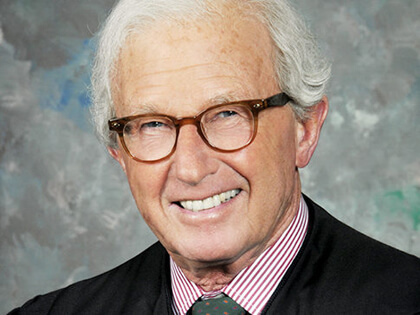Colorado Attorney General John W. Suthers. | OFFICE OF THE COLORADO ATTORNEY GENERAL
In a complex jumble of legal proceedings that suggests a growing consensus that marriage equality is inevitable in Colorado, one county judge there has thrown out the state’s ban on marriage by same-sex couples even as he stayed his ruling pending appeal, while a second county judge is refusing to halt marriages there. Even the judge who stayed his gay marriage decision later declined to halt weddings he concluded were not based on his ruling.
As a result, county clerks in Boulder, Denver, and Pueblo are now issuing same-sex marriage licenses, while the state attorney general has scrambled in both state and federal court to halt the weddings.
On July 9, Adams County District Court Judge C. Scott Crabtree ruled that Colorado’s ban on same-sex marriage violates the 14th Amendment of the US Constitution. At the same time, he stayed his ruling to give the State of Colorado the opportunity to appeal the decision.
Crabtree ruled on consolidated cases from Adams and Denver Counties that included plaintiffs who wished to marry and others who had married out of state and wanted their marriages recognized. Since Colorado adopted a constitutional amendment in 2006 barring same-sex marriage, the plaintiffs did not make state claims but rather based their suits on federal constitutional arguments.
As a result, the state would first appeal Crabtree’s ruling through the Colorado state court system but, if unsuccessful, could then petition the US Supreme Court. This was precisely the route that led to the successful 1996 challenge to Colorado’s Amendment 2, a voter initiative that had prohibited the state and its localities from protecting gay people from discrimination. The challenge to Amendment 2 was filed in Denver County District Court, where the plaintiffs prevailed in a ruling upheld by the Colorado Supreme Court. The US Supreme Court, in a decision that has since become a cornerstone of gay rights progress, subsequently found that Amendment 2 discriminated based on sexual orientation without a sufficient rational basis.
Crabtree quoted extensively from the long string of federal and state trial court marriage equality rulings that began with a federal district court judge’s December decision in Utah. And he gave great weight to the US 10th Circuit Court of Appeals’ June 25 decision that upheld the gay marriage victory in Utah on equal protection grounds. Like Utah, Colorado is located in the 10th federal circuit.
“The Court heartily endorses the recent holding by the 10th Circuit in Kitchen v. Herbert that the marital right at issue was never framed as the ‘right to interracial marriage’ in Loving or the ‘prisoner’s right to marriage’ in Turner or the ‘dead-beat dad’s’ right to marriage in Zablocki,” Crabtree wrote, referring to important Supreme Court precedents on the right to marry. “Instead, the Supreme Court has repeatedly utilized the term ‘fundamental right to marry’ without any limitations. The Court rejects the State’s attempt to too narrowly describe the marital right at issue to the right to marry a person of the same sex.”
As the 10th Circuit did, Crabtree then considered whether the marriage ban was necessary to promote a compelling state interest, a threshold question when a fundamental right is at stake. Colorado had argued its interest was in encouraging procreation and marital commitment for the benefit of children produced by different-sex couples, but Crabtree concluded this “interest” was concocted for purposes of defending the marriage ban in litigation and was “merely a pretext for discriminating against same-sex marriages.”
He noted that in seven prior federal marriage equality rulings as well as in the New Mexico Supreme Court’s ruling last year, “this notion of ‘responsible procreation’… [was] met without success.”
Crabtree concluded “the State does not have a sufficiently important/ compelling interest in forbidding same-sex marriages or nullifying Colorado residents’ valid out-of-state same-sex marriages. The Marriage bans are unconstitutional because they violate plaintiffs’ due process rights.”
Considering the question of equal protection, Crabtree found that because of his conclusion that Colorado’s “professed governmental interest was a mere pretext for discrimination,” the ban did not even meet the most lenient level of judicial review.
Finally, looking to the high court rulings in Massachusetts and Connecticut, Crabtree concluded that Colorado’s civil union law could not survive as a “separate but equal institution.”
Crabtree based his stay not only on the fact that all the other trial court rulings being appealed have been put on hold but also on the state’s argument that “the public has an interest in the orderly determination of the constitutionality of its laws and granting a stay will effectuate that end,” since only a final appellate ruling will settle the question.
Had Crabtree’s ruling been the only marriage equality action in Colorado, the situation there might have remained status quo for the time being. But in Boulder, the county clerk, Hillary Hall, responded to the 10th Circuit ruling in the Utah case by announcing she would begin issuing marriage licenses –– a development that predated Crabtree’s ruling. Her decision, she explained, was based on Deputy County Attorney David Hughes’ conclusion that in the wake of the 10th Circuit ruling, Colorado’s same-sex marriage ban was unconstitutional and no longer binding.
Republican Attorney General John W. Suthers' attempt to halt the clerk’s action failed in Boulder County District Court, when Judge Andrew Hartman, on July 10 –– concluding the issue before him was not whether same-sex couples have a right to marry –– found that the state had not made its case for preliminary relief. Though it was clear that Hall’s issuance of marriage licenses violated existing Colorado law, Hartman also considered the fact that both Crabtree and the 10th Circuit had found that same-sex couples have a fundamental right to marry.
Hartman concluded Suthers failed to show that allowing Hall to continue issuing licenses imposed an irreparable injury on the state and also found that the public interest in allowing individuals to exercise their fundamental federal constitutional right to marry outweighed any interest in requiring compliance with a law declared unconstitutional by two courts.
After Hartman ruled, the county clerk and recorder in Denver, Debra Johnson, also began to issue licenses. Arguing that Johnson was barred from issuing licenses under the stay issued by Crabtree, Suthers asked him to order her to cease. Crabtree, however, concluded that Johnson’s actions were not based on his July 9 ruling but rather on the results of the attorney general’s efforts to halt the marriages in Boulder. Consequently, he turned back the attorney general's motion.
So, with Pueblo County now jumping into the gay marriage licensing business, three of Colorado’s counties are allowing same-sex couples to legally wed at this time.
Suthers also traveled down a federal court route in his effort to halt the gay marriages in Boulder. On July 2, he filed a motion in a marriage equality case pending before the US district court in Denver conceding that despite his disagreement with the 10th Circuit finding in the Utah case, it does bind the court to grant the plaintiff same-sex couples’ motion for summary judgment. Noting that every other federal marriage equality ruling under appeal has been stayed, Suthers argued that the district court in Denver should do likewise. Suthers maintained that Colorado would suffer irreparable harm if marriages began before the issue were settled definitely by the Supreme Court –– an argument that would fail days later before Boulder County District Judge Hartman.
The federal district court has taken no action in response to the attorney general’s July 2 motion, with the case still pending.


































